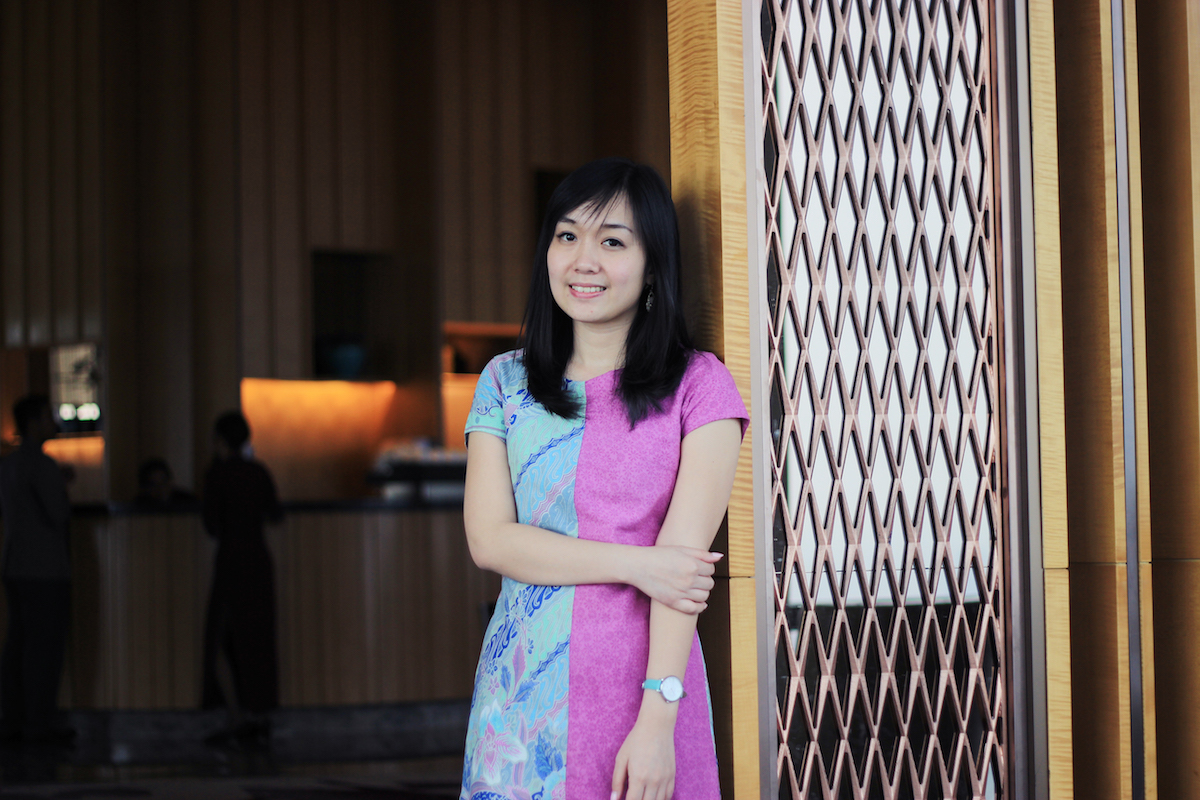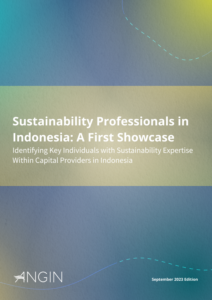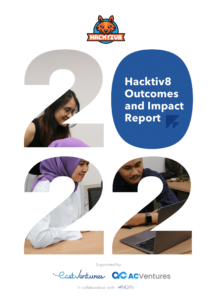Tell us a bit about yourself.
My name is Melina. I am an investment manager at Alpha JWC Ventures. We are a venture capital firm with a focus on Indonesia and the rest of Southeast Asia for early and mid-stage tech startups. We do investments with the founder-first principles, where we like to back great mindset and potential entrepreneurs.
Describe your journey. How did you get to where you are today?
My journey. My first job was in management consulting with McKinsey & Co. in the Jakarta office. I spent about three years there, and I did most of my projects in digital transformation and community development (in McKinsey, they refer to “tech” as “digital”). Some of the projects I did were things like digital banking development for conventional banking, e-commerce platform development for modern retailers, and ‘digital village’ creation where we empower offline-to-online technology transformation in rural areas in Indonesia.
Working on those projects made me very excited about tech industry. After couple of years advising corporations, I got interested in seeing the wider scope of tech in the startup landscape. I interviewed with both tech start-ups and VCs. I ended up in a VC because I felt very passionate in making a wider impact, and VC role would allow me to do it. By doing assessments and leveraging a network and wide community of companies, we can provide a wider impact and also help in community development and ecosystem building, like what ANGIN and Connector.ID do. I really think that based on my character and personal preferences, this is something that really suits me. I can also apply what I learned during my time at management consulting, especially in the assessment of companies, compatibility with founders, and portfolio management. So far, I feel very happy here.
As a VC, you’re able to see a wide variety of start-ups. From what you see, how are women entrepreneurs doing? How are the numbers? Do you see a lot in certain sectors?
This is a very interesting question. I’ve spoken at some panels and events on gender-lens investing and women’s entrepreneurship, and this question often popped up. I see that – and everybody knows this – women entrepreneurs are still very much a minority in Indonesia and in Southeast Asia. I would say that the visible ones are around 10-20% of all start-ups. If you look at our 20 portfolio companies, four companies have female founders. Four out of 20 is actually quite a good number for female VC-backed startups. We are actively trying to promote and encourage more women entrepreneurs in our investments going forward.
How does the investment landscape actually view these women entrepreneurs?
So when I said around 10-20% of all start-ups have female founders, those are the visible ones. But the VC-backed ones are even less than 10%. Yeah. And there are a few reasons for that. Which are actually due to how the landscape views women as entrepreneurs.
This goes without saying, but there’s a nonverbal stereotype within the VC community that I have actually observed and is also something backed by data. Recently, Alpha JWC had a female-led event called Alpha Female on women’s entrepreneurship and gender-lens investing. We featured some female leaders and practitioners that we see have great impact in female entrepreneurship. Some of them included: Sonia Barquin, a partner in digital banking, Dayu Dara, Head of GO-LIFE at GO-JEK, Alyssa Maharani of Google Accelerator and Grace Natalia, one of our female co-founders. We were talking about one very interesting data point from a Google research project indicating that there is a big discrepancy in terms of the proportion of males that got investments after pitching compared to females who got investment after pitching. Females are less likely to get investment, even though the content of the pitching was the same. The research was conducted across VCs, accelerator programs, and pitching competitions. To me, that is quite ironic. This is a data-backed research.
Even without data, I can see this in practice. For example, I was once in a chat with some other VCs and they were saying something like, “Oh the business idea is great, the market is big, but she’s the only founder and she’s female.” That to me is sad. Why? One, the community still holds females to unrealistically high social expectations. They ask, “What if she gives birth? What if she gets married? What about our investment?” That’s very sad, right? Second, they also don’t believe that females can scale themselves up or push themselves to be great tech leaders. Third, these people take it as a casual chat. They chat about it in front of me – who is also female – and they think of it as something that is very normal. To me, this is something that is deeply rooted in gender bias stereotypes. It is something that we – starting from us – really need to take action about, and a sign that we must encourage entrepreneurship from females. Create more chances for them, give more opportunities.
What are some tangible ways we can move forwards as a start-up ecosystem? Is it having more gender-focused events? Showcasing more stories? Or targeting a quota for women in portfolios?
Stories like these are definitely important. But what is equally, if not most important is actually how we take action. I like action-oriented initiatives such as gender-lens investing – really targeting female entrepreneurs and backing them to give them support. Second, we should not forget other female communities in the ecosystem who are non-founders. These are people like female tech enthusiasts, professionals, and leaders like C-levels, Head levels. They also need support. We should create support groups. Even small things like WhatsApp groups or small mini-networking events once a month, those are very helpful. I’m personally involved in some communities like this. One is SheVC, a community driven by female VC leaders and associates in Jakarta. Another is Fintech Female, a community driven by female fintech leaders in Singapore, including fintech founders, enthusiasts, and active investors like us in Southeast Asia.
How do we drive more female talents to the VC scene?
Similar to tech companies, tech VCs are also a male-dominated industry. Many times I found myself at a table or room full of men. In fact, in many pitchings I’m the only female. That is a fact. And so one solution is definitely role-modeling. Role-modeling is about two things. One is in terms of communication, the second is in terms of number. In terms of communication, initiatives like this – ANGIN Women’s Spotlight – is very helpful. Because you spotlight women in the ecosystem and that triggers other women to join and contribute in the VC landscape. In term of numbers, we should look into eliminating gender bias in recruiting. By hiring more women, we increase the number of role models.
I found very few female VC role models in Southeast Asia, especially in Indonesia. When I started my career as a consultant, one piece of advice that the HR told me was to look up to female role models at the firm in order to boost my development quickly. The firm at that time consisted of 30-40% female, with few of them in partner level. The female proportion is considered minority, but that is more doable compared to this industry. As a female VC – especially ones starting out in the first 1-2 years – it’s important to see how to succeed as a female. Even simple tips like how to self-brand, how to build presence, how to bring yourself in a meeting by asking right and targeted questions – those are the things we should get with more role models in the tech industry.
Men also carry responsibility for getting more females in the room and encouraging female role models. What are some tangible steps we can take to hold our male counterparts accountable?
I like this question! We’re talking about what men can do, right? One is eliminating gender bias in recruiting. If the quality of the candidate is the same, think about how to also balance gender in recruiting. Another is definitely during meetings, in pitching, or in discussions with other VCs, to try to really involve female counterparts by giving them a chance to speak or asking them questions, or even as simple as introducing them in the beginning. That helps in terms of confidence. Of course, we would expect a proactive approach from female VCs as well, but sometimes in a room dominated by men, that might be a challenge that is not really visible.
How do you go forward in your day-to-day being the only female in the room? Where do you get your confidence from?
The most important thing is definitely the mindset. If you think that because we’re female that we’re victimized, then we would act or behave as if we are the minority. Like we’re being discriminated, that we’re victims. I never felt like because I was female I had different capabilities than men. That has never been my mindset. But I see many females think that way.
A second tip is to try in every meeting, in every pitching, to give a good if not great impression. Show your credibility and capability, ask the right questions, and then give some good advice, some good feedback.
The third is to leverage our natural advantage as female. Being female, we do have one advantage in terms of character. We’re seen as more caring creatures. We are perceived as being able to understand and sympathize more with others than a man can. So leverage that. Because during pitching, entrepreneurs like to be listened to. Not just about whether they can be invested in or not, but also if we can give feedback to their challenges.
Have you yourself faced personal challenges? Any incidents of facing gender bias?
One is perhaps in terms of the jokes. I feel like some jokes are improper and can lead to sexual harrasment. Not extreme, but it’s still a form of harassment. For example, I once spoke at a tech event dominated by male audiences and they said, “Oh you should be his girlfriend, oh you might want to know me further.” It’s just improper. Building presence is very important. It can be done by not responding to those things while keeping ourselves polite.
Another challenge would be the one I mentioned before, where I saw some VC investors talking about a female founder, where they actually doubt her just because she is a female. The business is good, the market is big, but just because she’s a female – because she might get married or give birth next year, they chose not to invest. Those are the two incidents I see.
Do you have any advice for other girls who want to get into the VC industry?
One is to think about yourself as a pioneer. Because if you join now, you’ll be one of the first female VCs in Indonesia and in Southeast Asia. You’ll probably be one of the first 10% of the female VCs in Indonesia actually. While venture capital itself is a growing industry – we’re getting more mature, compared to a few years ago. Think about it as ‘we’re writing history and you’re being a part of it’.
Second, if you’re facing any challenges or any difficulties in building confidence, that is a very normal thing. But with time and through mentorship, by sharing with support groups or anyone you can trust, you can overcome it.





